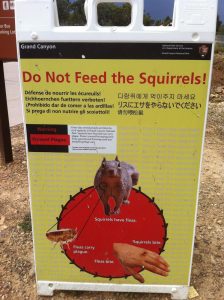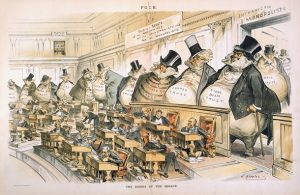Another year has come to an end, and what a year it was. From wildfires in Australia and California to COVID-19 to Black Lives Matter protests and a pivotal election, 2020 has been one for the history books. This makes the usual Concerning History tradition of pondering how this year will be remembered…a little redundant. Instead, we thought we would look back at the year that was and, in the spirit of the endlessly surprising 2020, recount some of the many historical topics we never dreamed would become immediately relevant to current events.
Kevin: I’ll start with the obvious: I think a lot of non-experts assumed that modern medicine had advanced us past the dangers of an economy-crippling pandemic like the Spanish Influenza of 1918-19. Epidemiologists and virologists have long known the dangers of airborne respiratory diseases, and the 2009 swine flu pandemic means we don’t have to look back 100 years for such an example, but until this year it was still possible to assume that public health infrastructures like the WHO and the CDC could contain the spread of novel viruses to the developing countries where they emerge. Instead, despite a century of scientific advances, we deployed traditional public health tools like quarantine, isolation, and social distancing, similar to the strategies employed by Captain Dwight Eisenhower to fight the Spanish Influenza in our alma mater town of Gettysburg. Meanwhile, while awaiting the vaccine—a truly historic achievement in its own right—we refought the same culture war between public health and “freedom” that Americans fought over masks in 1918. Especially striking was the insistence—especially from the White House—that there would be no second wave, even as real experts kept pointing to 1918-19 to warn how the fall and winter could be worse.

Bryan: While the Spanish Flu is by far the closest contagion-related history that became relevant in 2020, it is not the only one, nor even the most deadly. Even with all that 2020 has thrown at us, though, I never expected to read of an outbreak of Bubonic Plague—the Black Death itself—in Colorado in the middle of the summer. Thankfully the plague was confined mostly to squirrels, but by early September, there had been two confirmed and unrelated human cases. I’ve since learned that this is not exactly uncommon; in the last ten years, Colorado has had 14 reported human plague cases. In a larger sense, the history of the plague and its aftermath may indeed be relevant in the coming months. As the indomitable Jaime Belich would often remark when we talked about his work on the plague, pandemics are different from other natural disasters because they leave capital intact. In the fourteenth century, an abundance of capital consolidated in the hands of a smaller elite who found themselves dependent on fewer workers who simultaneously knew of their own increased worth led to peasant revolts, most notably in England. Only the future knows if similar protests will come to fruition after the events of 2020.

Heather: Speaking of capital impact, let’s talk trust busting. Ever since Roosevelt and Taft took on monopolies in the Progressive Era, there has been a precedent in the United States of breaking up capitalist behemoths to encourage healthy innovation and market evolution. In the past decade, though, the bigwigs at Facebook, Apple, Google, and Amazon have been toeing the line, testing the antitrust waters to see just how bloated their corporations can become before the federal government cracks down. Well, Uncle Sam finally had enough this year: starting this fall, the federal government began investigating the big four in earnest, and in early December 2020, the FTC walloped Facebook with not just one but two antitrust lawsuits that left ole Zuckerberg scrambling to defend his social media empire. The European Commission took a crack at Amazon, too, accusing the megaconglomerate of “distorting competition in online retail markets.” As we enter 2021, we at Concerning History will be keeping an eye on the proceedings and throwing a thank you to Teddy and William H. for laying the groundwork for this antitrust crusade.

Ryan: Both this year and last, my work as a graduate teaching assistant has seen me instructing college students in medieval history. The class being mostly freshmen taking the course for a requirement, one of the greatest challenges my supervising professor, fellow TA, and I face is making the era feel relevant to them and the present day. Given the proliferation of Viking-related media recently, we could have resorted to pop-culture hype for that portion of the course. Instead, though, we spent a good portion of our time talking about white nationalism. Since the nineteenth century, German nationalists, white supremacists, Nazis, neo-Nazis, and other far-right fringe groups have sought to turn the Vikings to their own purpose, warping real Viking symbols and history into a false mythology of an all-white, male-dominated warrior culture, constructing a false past to justify their beliefs and goals. The Anti-Defamation League currently identifies seven Norse-originating hate symbols, including Thor’s Hammer. The meanings of these symbols have been transformed by their adoption by Nazi and neo-Nazi symbology. Over the past few years, and with this one as no exception, educating our students on how history and historical can be intentionally misrepresented and repurposed to serve hateful purposes has been increasingly important. In 2020, we witnessed alarming upsurges in antisemitic incidents and white nationalist terrorism, building on an already growing trend over the past few years. Of course, the present use of these symbols does not erase their original meaning in Viking culture, nor their use by those who seek to legitimately connect to Norse history and heritage—but their co-option by hate organizations demonstrates the need for historical vigilance.
Jeff: You’d be forgiven if you missed this story with everything else going on, but this past spring a group of ex-Green Berets embarked on a filibuster expedition to Venezuela. In doing so, they were (knowingly or not) echoing the actions of several expeditionary forces of private Americans that sought to invade and overthrow Latin American regimes in the 1850s with the goal of expanding the institution of slavery. Filibusterer, from the Spanish filibustero and Dutch vrijbuiter (“freebooter”), originally referred to pirates who raided colonies in the West Indies. Later, it was applied to pro-slavery expeditions and from there to the parliamentary technique for which the term is most commonly used today. Much like their 1850s antecedents, the 2020 filibusteros were denounced by the U.S. government, even if their aims (in the 1850s to expand slavery and American territory, in 2020 to topple the Maduro regime in Venezuela) were in line with US foreign policy goals. Also like the 1850s expeditions, the 2020 raid was ill-equipped, poorly led, and not up to the task, and it failed miserably. It remains unclear whether Jordan Goudreau fashions himself a twenty-first century William Walker. Coverage of the failed May 2020 invasion typically opted to incongruously compare the operation to the 1961 Bay of Pigs invasion rather than the much more similar if far less well known filibustering expeditions of the mid-nineteenth century.

2020 has certainly been a year for surprises. As this year and, soon, Concerning History’s fourth year in operation ends, we wish everyone the best and hope that sometime in the near future, we can return to our normally scheduled lives and stop needing to dust off our history books to point to references no one thought would be a thing in the twenty-first century.
